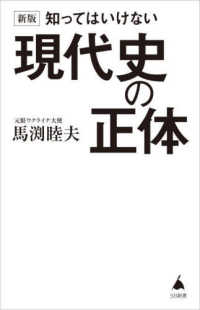- ホーム
- > 洋書
- > 英文書
- > History / World
Full Description
The book presents a new interpretation of the Santal Rebellion, the Hul 1855-1856, drawing on the colonial sources as well as Santal memories. It offers a critique of postcolonial approaches that overlook specifically tribal perspectives and see the Hul as a class-based peasant rebellion.
The author analyses the Hul and its participants—the Santals and their opponents, both the colonial administration and the Bengalis. He also looks at the attempts of the Hul's leaders, Sido and Kạnhu to reform the Santal religion. Offering a new, respectful reading of the Hul's religious legitimation, the book argues that changes in Santal religion and ethics were responses to the colonial regime's new and aggressive economic order. The Hul's leaders, Sido and Kạnhu, demanded the introduction of just laws based on the universal principle of equality. This historical approach leads to a call for the inclusion of the voice of tribal and Adivasi minorities when formulating politics for their development in the 21st century.
The book is relevant for researchers and students of social history, social reform, tribal and indigenous studies, postcolonial studies and South Asian studies.
Contents
List of Figures. Preface. Glossary. 1. Introduction 2. A brief note on existing research related to the Santal rebellion 3. Sources of information related to the Santal rebellion and Santal religion 4. The Santals and the Damin-i-Koh 5. Changes of religious mood in the run-up to the Santal rebellion 6. The course of the Santal rebellion 7. Transformation of religion and ritual legitimation 8. Purity and atrocities 9. Aftermath and amends? 10. The Santal rebellion on the background of Indian religion in the 19th century 11. Identities and rebellions - tribal or peasant 12. Logics, ethics and existence 13. Summary and conclusions. Appendix I Place names. References. Appendix II Bengal Judicial Proceedings.








